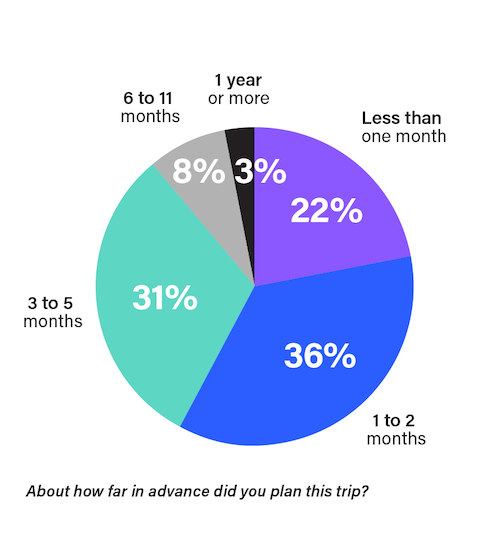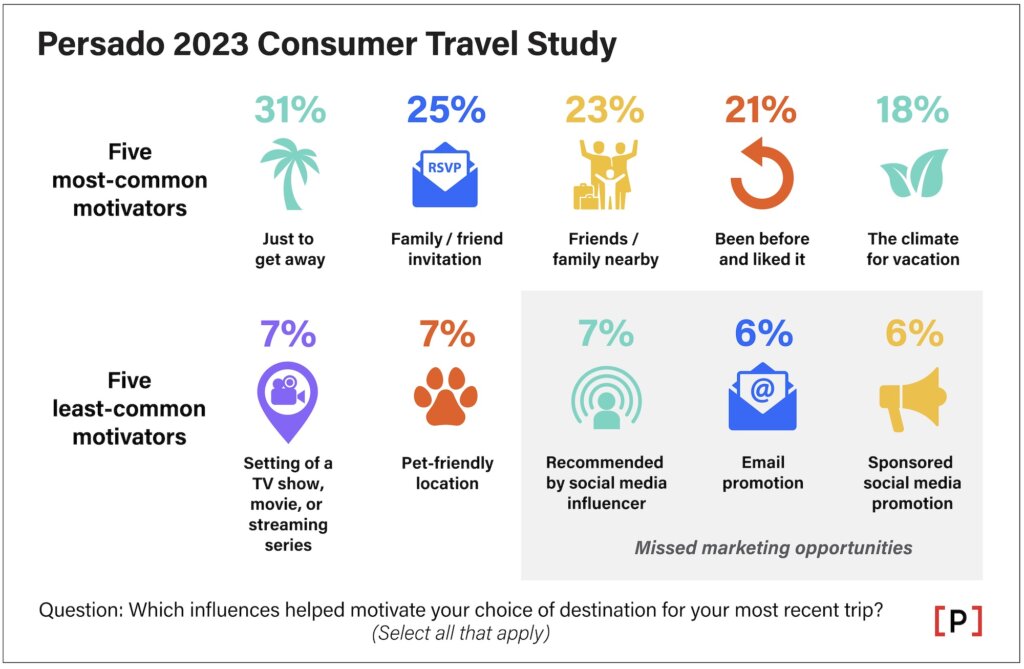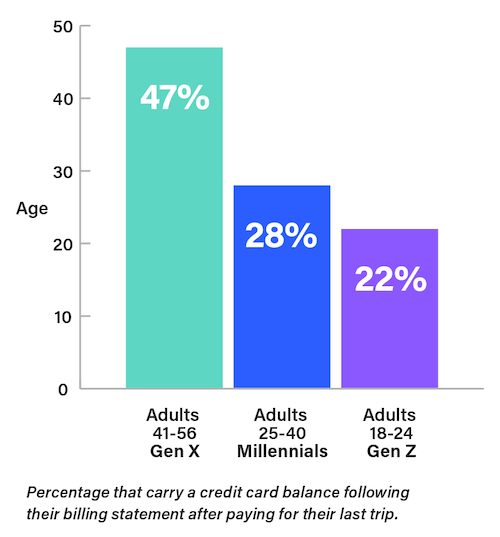Travel & Hospitality brands invest ample amounts towards digital marketing and on personalizing the online booking experience. But, what truly inspires customers to book a trip? Not to simply “like” a social media post, open a marketing email, or add something to their trip summary page, but to purposely book an experience? Let’s explore the latest in consumer behavior within tourism marketing based on our tourism market research.
Persado, creators of Motivation AI, an enterprise Generative AI custom-built to produce language that motivates customers to engage and act, recently conducted a survey on consumer behavior in tourism marketing. The survey, conducted in partnership with Momentive, took place in early March 2023. The objective was to uncover the factors that motivate today’s consumers to book travel and the inspirations behind their choices of destinations. We surveyed 600 US-based adults, ages 18-56, spanning three generations (Generation X, Millennials, and Generation Z).
Surprises related to consumer behavior in tourism marketing
The first of three, big surprises in the survey results surrounding consumer behavior in tourism marketing was that social media does little to inspire bookings. Only 7% of the survey respondents stated that their destination for a recent trip was motivated by an influencer, according to our tourism market research.
The second surprise, given the current economic climate, was that personal debt had little effect on individual travel spending.
Finally, there were far more similarities in how people of different ages book travel than there were differences.
Tourism marketing motivation: What motivates consumers to travel?
Within the past 12 months, the survey respondents took an average of 3.76 trips distanced 120+ miles away from their home for purely leisure reasons.
Consumers are still prioritizing travel, despite the tightening economic conditions. In fact, 74% of the respondents reported that they intend to take the same number, or more, of vacations in 2023 than they did in 2022. Therefore, using marketing to affect consumers’ choices to travel, beyond their own intent, is the true challenge.
When asked what motivated their most recent vacation, the top three motivators were as follows: escaping their day-to-day routine / relax & unwind (34%), going on a trip with friends (25%), and reconnecting with loved ones (25%). Based on these consumer travel motivation findings, the majority of individuals book travel for reasons intrinsically tied to emotion.
When do travelers plan their trips?
Most travel is relatively spontaneous, planned less than half a year before the trip will take place. The largest share of respondents—36%—planned their trips only a month or two in advance. 31% planned with between 3 and 5 months notice. Nearly a quarter—22%—planned one month ahead. Less than 10% planned more than 6 months ahead. Only 3% planned their most recent trip a year or more in advance.

Trips costing less than $500 were more likely to take place on short notice (less than a month). Those costing more than $1000 were planned by more than 70% of respondents with 1-5 months of advanced notice.
The key message for travel and hospitality brands is to market at the right time to inspire customers to book.
How do consumers travel?
People still prefer the affordability and convenience of using their own, personal vehicle for travel: 54% of adults used their personal vehicle during their most recent trip, in contrast to 46% who traveled by plane. 18% used a rental vehicle.
Tourism market research reveals where consumers stay
According to our tourism market research, 69% of survey respondents stayed in a hotel/motel or resort for at least part of their trip. This preference is greater than twice as many of the other accommodation options, which included:
- 29% stayed in a family/friend’s home
- 14% opted for a rental home
- 5% ventured out in a tent
- 4% stayed on a ship
- 2% spent their trip in an RV
The popularity of hotels/motels and resorts may be attributed to credit card point accumulation and travel rewards programs that offer more affordable, and sometimes free, hotel stays. Additionally, hotels and resorts offer easy check in and check out processes, as well as room services during stays.
Travel trends around rental homes
Rental homes, in contrast, may have fallen out of favor due to rising booking fees and high cleaning fees. The combination of those factors alongside the expectation that renters take out the garbage, clean the home, and sometimes supply their own towels, linens, and basic paper goods, has turned rental homes into a less appealing option. Airbnb, for example, does not offer a loyalty program. Therefore, frequent travelers do not receive rewards or earn status. A loyalty or rewards program has the potential to be a great growth opportunity for rental home sites such as Airbnb. Learn more about travel loyalty marketing. Unlike options, such as HotelTonight, that offer last minute deals on hotel stays or websites, like Kayak, that allow travelers to compare flight prices, rental home sites do not offer easy avenues for travelers to find deals.
Another common complaint surrounding Airbnb is the lack of owners or representatives onsite for if a renter becomes locked out or experiences an issue with the plumbing. This travel industry trend of rental homes becoming less convenient or enjoyable to stay in and harder to rent is one to follow.
Social media and digital marketing influence on consumer travel motivation
Social media users that express an interest in travel are often presented with beautiful ads or influencer posts for exotic destinations within their feeds. Given the rapid rise in travel influencer posts, it would seem straightforward to assume that social media influencers have a major impact on consumer decisions. Yet, when asked what motivated their choice of destination for their most recent trip, only 7% of the survey respondents validated that they had booked based upon the advice of an influencer. The influence differed by age group, but not by much: Among Generation Z (ages 18 – 24) respondents, 9% reported being motivated by a social media influencer, while 10% of Millennials (ages 25-40), and only 1% of Generation X (ages 41-56) were influenced.
Why influencers may not drive bookings
There are several hypotheses as to why influencers seem to have little impact on conversions. While consumers may interact with influencers’ photos and watch their videos at much higher rates across social media platforms, these posts may not stumble into the consumers’ line of sight at the exact moment they are booking a trip. In other words, the intent isn’t present. In addition, social media posts from influencers are deemed aspirational, rather than practical, when it comes to what the average consumer has the budget for. Furthermore, almost any user can refer to themselves as a travel influencer. It is becoming significantly more difficult to differentiate between true influence and a savvy social media participant with an aesthetic online presence.
Digital marketing and travel bookings
General digital marketing is even less effective at inspiring bookings. Only 6% of survey respondents were inspired to book a trip after seeing a sponsored social media post, and only 6% were motivated by an email marketing promotion. Although digital marketing does have the potential to motivate more bookings, travel and hospitality brands must market to customers at the precise moment and with greater, personalized messaging.
General segmentation based on demographics or geography does not provide enough nuance for personalization. Simultaneously, consumer behavior trends change quite frequently and forward-thinking marketers are using AI to keep up. Persado generates personalized digital marketing messages across the entire digital customer journey; informed by data on what has generated the highest responses to 1.5 billion consumer interactions amongst 150 million US-based consumers. On average, Persado customers typically experience a 41% conversion lift across their digital channels.
Top travel brands that wield Persado’s Dynamic Motivation on their trip summary page to deliver personalized messaging at the time of booking drive 3-5% more online revenue, and increase overall order value using personalized, dynamic messaging for bookings and upgrades.

So, what was effective in inspiring bookings according to our survey?
Friend/family invitation (25%) and just to get away (31%) influence destination choices far more than influencers or digital marketing.
Does personal debt play a role in consumer travel motivation choices?
Consumer debt is increasing, according to Experian. Cost is currently the biggest barrier preventing respondents from traveling, including travelers in the older age group. 50% of Gen X respondents reported cost as a barrier compared to less than 40% of Millennials and Gen Z. Yet, despite the increasing prices, cost is not fully preventing consumers from their travel endeavors. Only 9% of respondents said they will delay travel until they pay off personal debt. Whereas, 34% said that they, instead, limit their travel frequency due to personal debt, and 25% choose less expensive trips due to personal debt. Meanwhile, 15% stated that personal debt has not affected their decisions to travel.
How much do they spend?
More than 50% of reported trips cost less than $1K.
Surprisingly, for trips costing over $1K—and even those greater than $5K—the majority of respondents paid with cash (vs. with a credit card). For those paying with a credit card (46%), two-thirds paid the expenses off in full prior to their monthly billing statement. Only one-third continued to carry a credit card balance.
Interesting finding: Generation X (ages 41-56) were more than twice as likely than Generation Z (ages 18-24) to carry a credit card balance following their billing statement when paying for a trip. This supports the phenomenon that Generation Z sees money differently from previous generations. Their generation is more conservative with debt, prioritizing financial literacy, and investing earlier.

Generative AI and tourism marketing motivation
The role of Generative AI in travel and hospitality is rapidly growing. The Persado Motivation AI Platform uses Generative AI to create language that personalizes the online booking experience and motivates consumers to book and/or upgrade at key moments, including the trip summary page: the most pivotal moment in the online booking experience. Motivation AI is a specialized class of enterprise Generative AI technology that consistently drives business outcomes. Persado Motivation AI uses advanced machine learning, natural language processing (NLP), and deep-learning transformer models to understand intent and create emotion-informed messages that are quantifiably proven to motivate individuals to take action.
Emotions that motivate travelers to book
Now that we’ve taken a deep dive into the external factors that inspire consumers to book travel, let’s examine the digital marketing language that acts as consumer travel motivation and, most importantly, the emotions and personal narratives that perform best in travel campaigns. The Persado Content Intelligence team analyzed the performance of digital marketing campaigns across 13 travel clients and 54 campaigns that ran from April 2022 – April 2023. These digital marketing campaigns included promotional campaigns, customer acquisition campaigns, and editorial campaigns.
Words that motivate action
When examining emotions, consumer behavior in tourism marketing unveils that Urgency succeeds at getting customers’ attention. However, Urgency does not succeed at getting people to take action. Instead, Exclusivity, or making people feel as though they have special access or are getting an exclusive opportunity, acts as tourism marketing motivation.
Travel brands expressed Urgency in digital marketing campaigns through using language such as:
- Begin planning asap
- For a limited time only
- Open soon
Exclusivity was conveyed with digital marketing language such as:
- You’re still eligible for this offer
- You’ve scored access to
- You’re invited to earn bonus miles
Since travel is appraised as a luxury purchase, it stands to reason that customers want to book at the precise moment the opportunity presents itself, rather than be driven by time limitations.
Attention and Achievement were also among the top performers in travel marketing motivation. These emotions both inspired travelers to take notice of a message and motivated them to take action. This suggests that travelers are more responsive to language entailing praise and reward. People prefer to feel as though they have earned and deserve their travel plans. The success of the emotion Attention suggests that people respond well when they are alerted to the importance of a message or when the message is tonally direct.
Brands used Attention with the following digital marketing copy:
- Current status: on vacation
- Message for you
- Special message
- Attention, travelers
Here are some examples of language from campaigns based around Achievement:
- You’ve scored inspiration for your next trip
- Congrats on your big day
- You’ve landed the opportunity
- You’ve earned it
- Congrats you’re invited
- You’ve earned a much needed break
Personal narratives that drive positive consumer behavior in tourism marketing
An observation the Persado Content Intelligence team proclaimed within the 2023 Customer Motivation Report continues to ring true: the personal narrative or campaign story that resonates the most with people this year is the story of Rejuvenation. This is consistent with one of the consumer travel motivation findings in the survey. “Escaping day-to-day routine / relax & unwind” was the most popular motivation for planning a vacation. When framing digital marketing messaging for travel, it is crucial to provide people with the perception that their experience will be rejuvenating, refreshing, and relaxing.
Understanding the external factors that inspire whether or not a customer books a trip, along with what language motivates travelers to book or upgrade, is pivotal to travel marketing performance. From the pre-booking preparation to the post-trip unwind, travel is an emotional experience. Travel and hospitality leaders possess the unique opportunity to wield the power of Motivation AI technology to better understand consumer behavior in tourism marketing and create digital marketing messaging that is proven to motivate bookings.
Check out the full survey analysis on What Motivates Consumers to Book Travel.
The post Consumer Behavior in Tourism Marketing: What Motivates Customers to Book Travel? appeared first on Persado.
